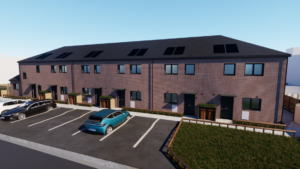Q & A with Tony Stacey: Forging an alternative narrative about social housing
 Since setting up in 2008, Placeshapers has become a network of more than 100 housing associations driven by the desire to forge an alternative narrative about the role social landlords can play in their localities. Chair Tony Stacey, chief executive of South Yorkshire Housing Association, talks to New Start about why we’re sleepwalking into a housing crisis
Since setting up in 2008, Placeshapers has become a network of more than 100 housing associations driven by the desire to forge an alternative narrative about the role social landlords can play in their localities. Chair Tony Stacey, chief executive of South Yorkshire Housing Association, talks to New Start about why we’re sleepwalking into a housing crisis
—————————————————————————————————————————
How did the Placeshapers movement begin?
It started six years ago as a reaction to a fairly mindless, ‘big-is-better, everyone is going to merge with everyone else’ narrative [in the housing association sector] that was getting too loud. I’d been to an National Housing Federation conference called ‘To merge or not to merge’ and everything on the programme was about how to merge. There was nothing about why you might not want to merge. This powerful narrative had an air of inevitability about it and if you keep saying it, boards start thinking they’re standing in the way of progress if they don’t merge. And yet all the evidence shows it doesn’t drive greater efficiency. Placeshapers was a reaction to that and, because of what we’ve done since, the drive to merge is not taken as a given anymore. We’ve made it ok to carry on at the size you are if that’s the right thing for your organisation. But as well as playing an influencing role, Placeshapers has developed another arm around sharing best practice – we have 750,000 homes between us and want to co-operate with each other, not compete. As soon as a member is on to something they share it with others.
What sets your members apart from the rest of the sector?
Mission. Our members have a shared mission because they are asked to sign up to four principles: putting our residents and customers at the centre of what we do and ensure they have real influence; providing more than just landlord services because we care about the people and places where we work; recognising the importance of a local focus; and we believe there’s strength and benefit to residents and stakeholders in maintaining a strong, independent, diverse, values-driven housing association sector.
The best story I can give to explain how we’re different is when one member, Shepherds Bush Housing Association, was at a meeting with a local authority along with other landlords. None of the other housing associations liked what was being proposed by the council and said, “Iif you’re going to do this we’ll work somewhere else”. Shepherds Bush HA stayed at the table. They didn’t like it either but knew they had to find a way to work with the council – they were a placeshaper and weren’t about to abandon the area where they were based.
Another example is how we work collaboratively, sometimes making it up as we go along. South Yorkshire Housing Association (SYHA) formed a northern Placeshapers group with two other members – Gentoo Group and St Vincent’s Housing Association – so we could jointly put a bid into the Department of Health’s Over 2 You fund to bring users of our services in as quality assurers of care and supported housing. They act as inspectors but also gain skills that could help them gain employment. We were the only social landlords that were successful and out of 100 approved bids we were among three pilot projects to be showcased by the department.
Given your focus on people and the sustainability of places, how do you continue that in times of austerity – particularly when there is so much emphasis on house building? Can you do both?
It’s not just about building social capital but also about building homes. Our members are above average when it comes to using our capacity to invest in development projects. We try to make sure that everything we are doing has the maximum possible impact for the places we work in. But we have to have proper strategic discussions with our boards about how we get that balance right. We also need to continue to develop an approach to social value and tell the story in terms of how we measure the outcomes of what we do. Most members use methodology developed by Hact to do that at the moment.
We’ve also needed to make sure the regulator [Homes and Communities Agency] doesn’t just measure value for money in terms of bricks and mortar. We got it changed to make it clear that it’s not just about building more homes.
Is government listening to the Placeshapers’ message?
Absolutely. Brendan Lewis was in complete agreement with everything we said at out last meeting and asked how he could get others to adopt our approach. The general pitch of Placeshapers chimes really well when we meet the main political parties.
And at a government policy level?
I think so. We try to make sure we keep on top of the various policy documents and as soon as we think something is going to be hostile to Placeshapers we get on to it. They will hear the ‘big is best’ narrative about rationalising the sector from time to time. We just need to make sure they hear us talking about localism and placeshaping three times as often.
 What did you make of the recent Lyon’s review of housing for the Labour Party?
What did you make of the recent Lyon’s review of housing for the Labour Party?
I don’t think it’s good enough. There are good ideas, such as the investment bank, but without grant and without a programme of social housing building it’s not going to happen.
I think the Labour Party has got to get its act together in relation to social vs affordable housing – and that means addressing the issue of rents. I think this government has got away with murder with regard to fudging the distinction between social and affordable rent. The term ‘affordable’ is clearly Orwellian. How can rents of £191 per week in London possibly be affordable? We need clarity on rents.
We’ve got to use the ‘G’ word – grant, which people are too scared to do. They are worried that if they say ‘grant’, people will say “you’re a lot of grant junkies – this is a time of austerity”.
It seems to me and to most people who are
housing professionals that we are already at rock bottom.
And yet a report by Professor Ian Cole at Sheffield Hallam University shows that for 31 consecutive years after the Second World War austerity period we built over 300,000 homes a year. How? Because there was a cross-party consensus about the need for investment. At every general election parties would try to outbid each other on how many homes they’d build. We kind of have that now, except there’s no clear line of sight on how it’s going to happen. When private house builders were asked whether the industry’s target of 200,000 homes a year could be met, 94% said no. They’re quite happy to keep it at 140,000. They have reduced supply and upped their margins. It has to be done through housing associations and local authorities building again at scale. The only way that is going to happen is through grant.
Are some social landlords in danger of being drawn away from their core purpose of providing homes for those who can’t afford mainstream housing?
I’m concerned about it. I’m alarmed about what I hear from some associations. I heard one chief executive say he didn’t want to be housing people on benefits. There’s a small minority, maybe a dozen housing associations in the country, whose policies do alarm me for that reason. There’s quite a lot more who are commercialising their operations, thinking about different kinds of customers and different kinds of products. Provided they do things in the right way I’m not worried. We have a commercial subsidiary at SYHA and we’re looking at different products – but we’re not converting properties to affordable rent. As long these activities are a complementary offer then that’s ok.
In a recent Chartered Institute of Housing paper two of your members warned that if regeneration money returns we should avoid going back to ‘regeneration competition’ as it almost perpetuates poverty. What would a Placeshapers’ regeneration policy entail?
I think what we’re trying to do at SYHA is build our organisational capacity, build ourselves as individuals and build capacity for our customers. It’s a shared journey, not something that we as professionals ‘do’ to people.
Our longest serving manager took his own life last year. That made everybody here think about the importance of building resilience and the ability to deal with whatever life throws at you. An example of a way in which SYHA is doing that is through Sheffield Money. It will provide a credit union, a CDFI and a housing benefit advice – a triage service – when it’s up and running in early 2015. It’s not just for our customers – debt and poverty is an issue for some of our own staff who may well be in the grips of Wonga and need help.
Most Placeshapers housing associations are resource wealthy organisations and depending on how we deploy those resources we can have a very significant impact. But it’s also about thinking about what more we can do without spending more resources.
How do you see the future of social housing panning out over the next 10-20 years?
What isn’t going to happen is this super-consolidation of the sector. There will continue to be mergers – some for the right reasons, some for the wrong reasons. But for each one that happens there will be another one that pops up, for example through a local authority stock transfer. It will change but I don’t think it’s going to be reformed along the lines of the banking or energy sectors – thank God! If we lose touch and become the wrong kind of organisations then we are ripe for disruption. If the consolidation gets it wrong and those super-associations lose touch with their roots they will get disrupted.
But we have to come up with something as a country on rents. It’s completely chaotic at the moment. It’s not only bad for the customers, it’s bad for the country and is pushing up the housing benefit bill. We need to come up with a rent regime that works.
In terms of house building, I think it has to hurt us enough as a country before we do something about it. It seems to me and to most people who are housing professionals that we are already at rock bottom. But I don’t think that we as a country have so far got the fact that it’s a housing crisis.
To find out more about Placeshapers click here.















